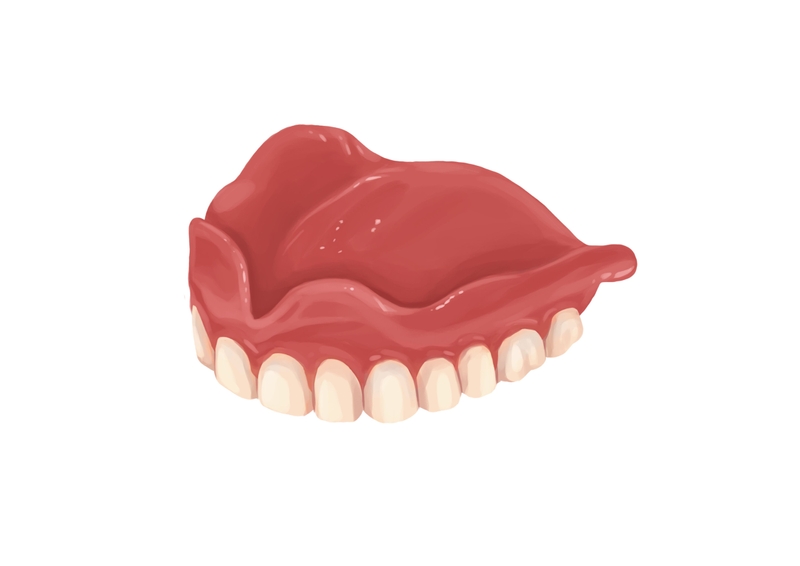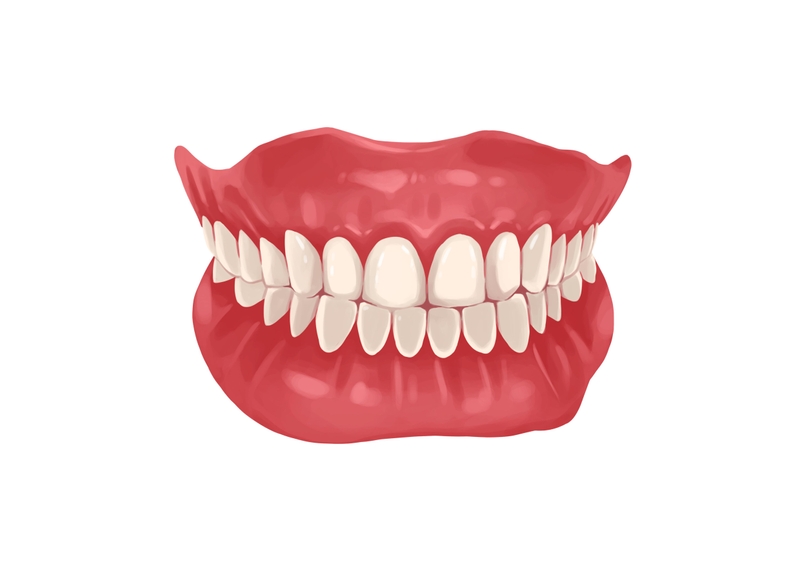- Wearing new dentures can increase saliva flow, cause sore spots, change your pronunciation and articulation, and make eating more difficult.
- To get used to your dentures faster, switch to a soft-food diet and practice speaking. Adhesives can prevent dentures from dislodging.
- Do not treat denture sores on your own. See a doctor to get proper treatment.
Use Authority Dental to book an appointment for the affordable dentures nearby, or get a dental plan and save big on all dental procedures, including dentures.
What problems can occur when wearing a new denture? Here's everything you need to know.
What to expect with new dentures

Picture by Authority Dental under CC 2.0 license
No matter who your dentist or prosthodontist is and how well the dentures were made, there are a few things that you can expect to experience with new false teeth. These common denture issues are manageable and can be fixed quickly, but you should be prepared for an adjustment period. If they do not go away for an extended period, you may have to consider reline or professional denture repair near you.
Sore spots
Sore spots are the most common complaint among new denture wearers. While impressions of your gums were taken to ensure the best fit, they may need to be adjusted for greater comfort. This is especially true if you have immediate dentures, meaning the dentures were placed right after your teeth were extracted. After removing teeth, the bone can remodel for several months, which can change how your denture fits and create new sore spots.
Do not try to adjust sore spots yourself. It may seem like a simple fix if you have some tools at your disposal, but making changes to your denture yourself will void the warranty your dentist provides. If you have a sore spot, make an appointment with the specialist. You can expect to need several visits in the first two weeks after getting a new denture.
Discomfort
Aside from the sore spots, you may experience some discomfort with a new denture. Again, if you recently had teeth extracted, you can expect the normal pain that follows tooth removal. The discomfort should subside after a couple of days and should be gone entirely within one or two weeks.
Dentures dislodging
Using dentures takes practice. At first, your dentures might become dislodged when you try to eat and speak. You will learn to use your dentures so they stay in place. Another excellent remedy is to use denture adhesive. Over-the-counter denture adhesives are often used on mandibular (lower) dentures because they lack the suction advantage of upper dentures.
Increased saliva
Anytime you introduce something new to the mouth, there is an increase in saliva flow. The same is true when someone gets braces or clear aligners for orthodontic treatment. Your brain actually thinks you have food in your mouth, and it triggers the stimulation of your salivary glands. The increase in saliva should only last for a couple of days.
Change in pronunciation
It is common to have trouble saying certain words when you get new dentures. They can feel bulky and make it hard for you to pronounce. A lisp is not uncommon to hear. Like everything else, you will quickly get accustomed to a new way of speaking, and your speech will return to normal within a short time.

Difficulty in eating
There is a trick to eating with dentures. When we use our natural teeth, we often put food to one side or the other. With dentures, you need to place food evenly on both sides. This keeps the denture from getting dislodged. Also, you may have difficulty biting into foods like sandwiches and apples. It is best to cut up food and place it at the back of your mouth, rather than using the front teeth.
Tips for adjusting to new dentures

Picture by Authority Dental under CC 2.0 license
If you want to get used to your new dentures as quickly as possible, follow these tips.
Eat softer foods until all your sore spots have gone away. Avoid hard, chewy, and sticky foods.
Perform proper oral care and denture care. Rinse and brush your dentures every day and place them in a glass of water overnight. You can also use a denture cleanser to help keep them clean.
Do not wear your dentures at night.
Use denture pads to help with sore spots.
Wear your dentures as much as possible. This will help you get used to them quickly.
Do not adjust dentures yourself. Always ask a dental professional to adjust them.
Practice speaking with your dentures. Read aloud from a book or magazine, or sing along to your favorite song.
Lee points out: "Your job is to be patient, practice speaking by reading aloud, and start with soft foods. Your dentist’s job is to be your pit crew—making the minor but crucial adjustments to relieve the sore spots that will inevitably appear. We’ll work together through this “break-in” period. With a bit of time and practice, it can become second nature."
FAQ
How long does it take to get used to new dentures?
Most people can get used to new dentures within one or two weeks. If you had a recent tooth extraction, it could take longer.
Do you put dentures in wet or dry?
Is it normal for new dentures to hurt?
Some sore spots and discomfort are normal when you get new dentures.
Harry Lee, DMD
When I deliver a new set of dentures, I always tell my patient the same thing: for the next few weeks, your brain will lie to you. It will tell you that this new prosthetic is huge and foreign, and that you are producing a gallon of saliva every hour. I need them to know that this is not a sign of a problem; it is the completely normal, first stage of your body adapting to something new.